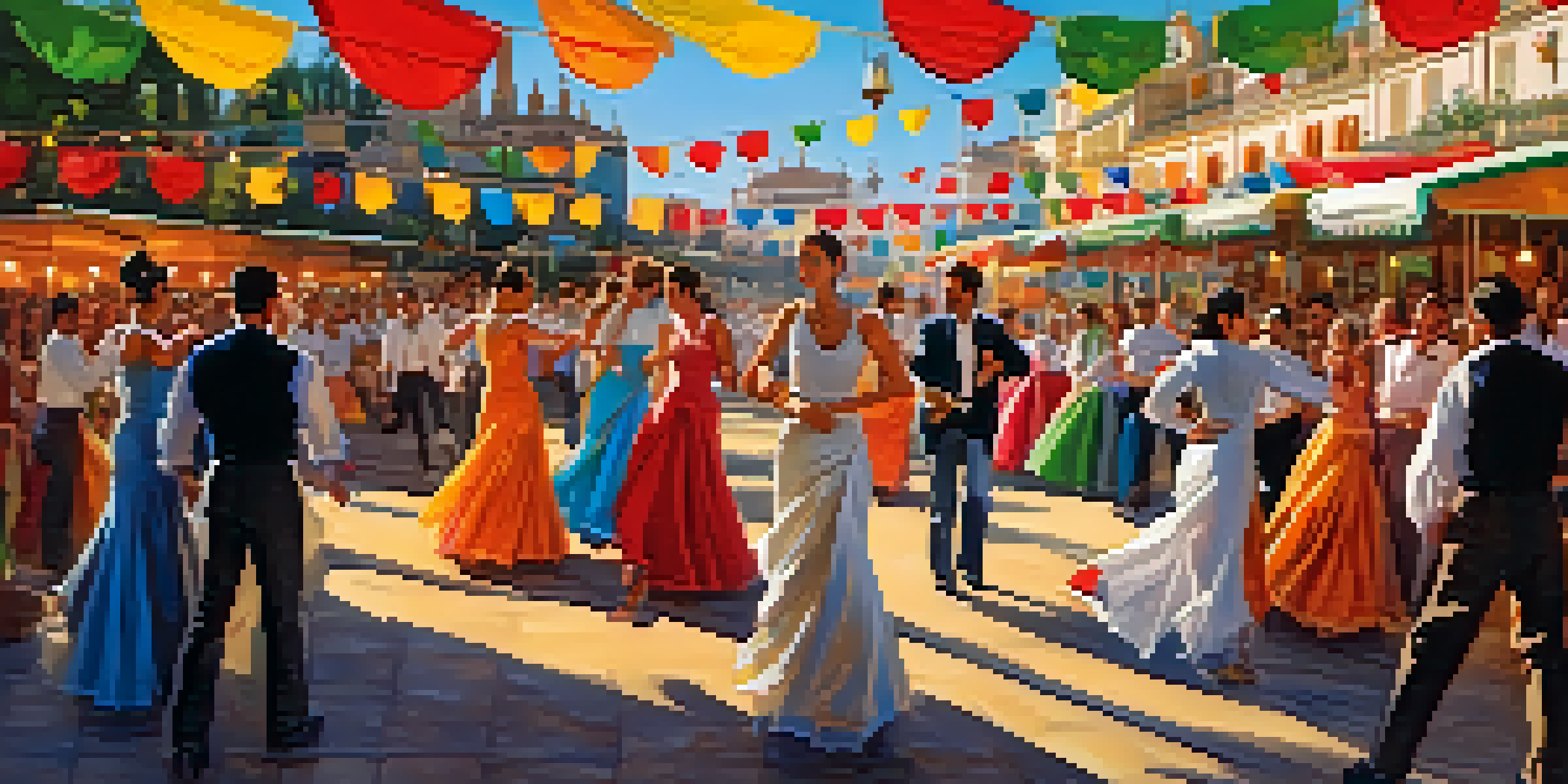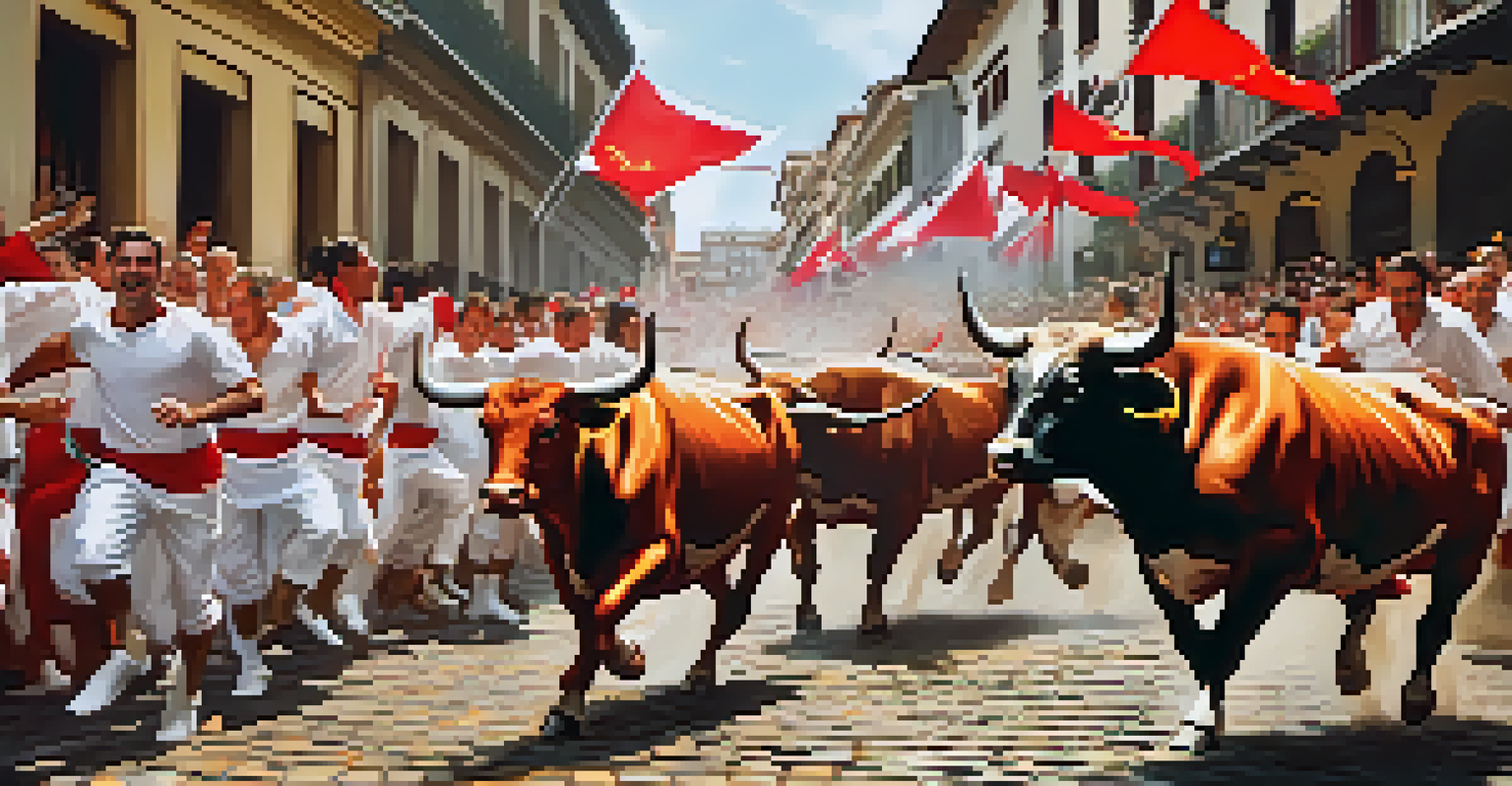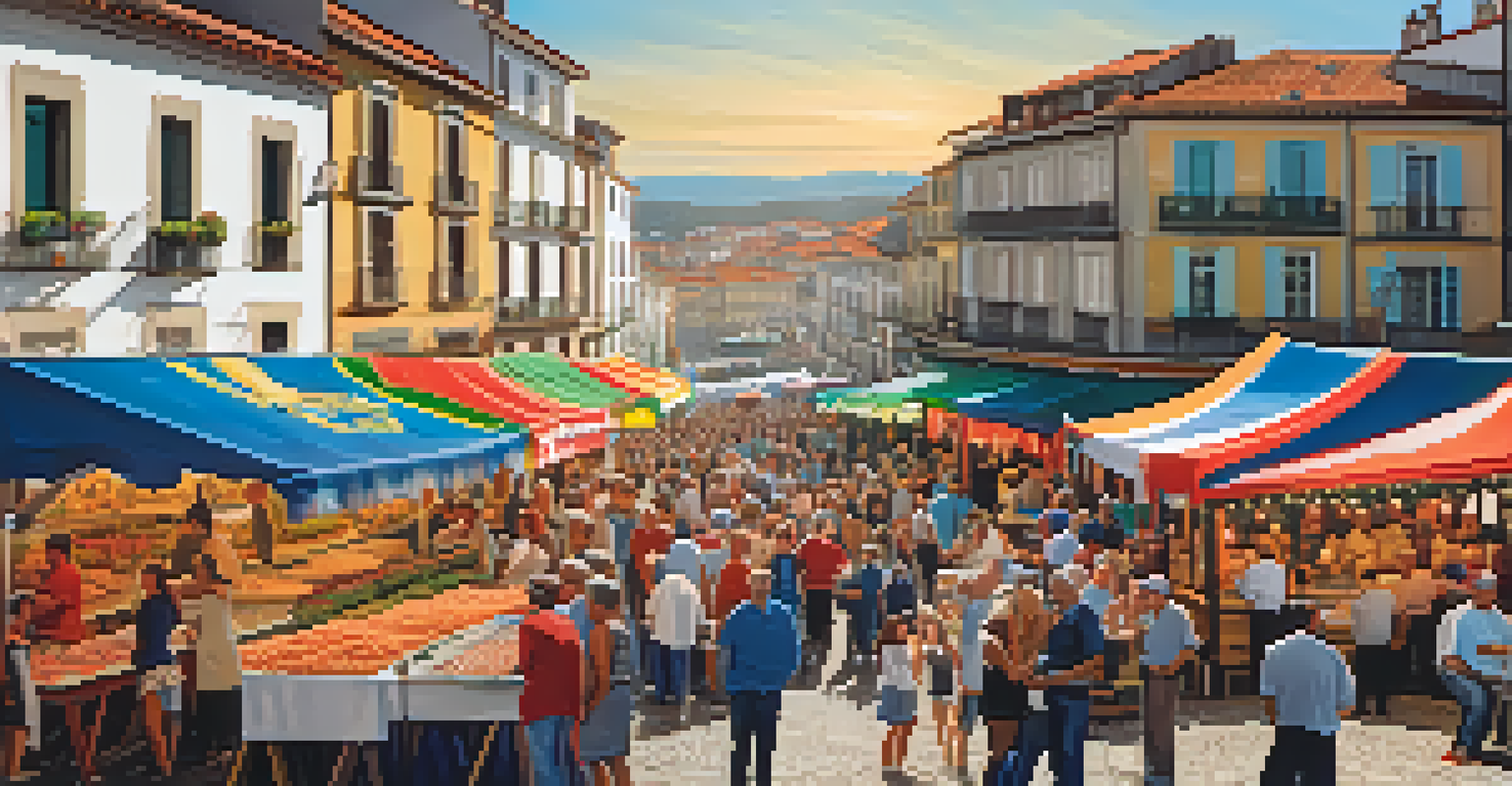Festivals and Fairs: Capturing Spain's Vibrant Celebrations

The Essence of Spanish Festivals: A Cultural Celebration
Spain is known for its rich cultural tapestry, and its festivals are a vivid expression of this heritage. From the small village gatherings to grand city parades, each festival reflects unique local traditions and shared values. These celebrations often stem from historical events, religious practices, or seasonal changes, making them deeply rooted in the community's identity.
Festivals are a time for people to come together and celebrate life, love, and community.
One striking example is La Tomatina, held annually in Buñol, where participants engage in a massive tomato fight. This playful chaos not only brings people together but also showcases the town's spirit and camaraderie. Festivals like these highlight the joy and exuberance that characterize Spanish culture, inviting everyone to partake in the fun.
As you explore these festivities, you'll find that they offer more than just entertainment; they foster a sense of belonging and community. Through music, dance, food, and tradition, these events create lasting memories and strengthen social bonds among participants.
Famous Spanish Festivals: A Closer Look
One of the most iconic festivals in Spain is the Running of the Bulls during the San Fermín festival in Pamplona. This adrenaline-pumping event attracts thousands of visitors each July, where brave souls run alongside the bulls through the city's streets. It's not just about the thrill; it's also about honoring the festival's long-standing traditions and the vibrant atmosphere that envelops the town.

Another notable celebration is the Feria de Abril in Seville, a week-long festival of flamenco, food, and joy. The city transforms into a colorful spectacle filled with traditional casetas (tents) where locals and visitors dance, eat, and enjoy each other's company. This festival encapsulates the spirit of Andalusia and showcases the region's rich cultural heritage.
Festivals Reflect Cultural Heritage
Spanish festivals are vibrant celebrations that embody the country's rich cultural traditions and community values.
Each festival comes with its own set of customs, music, and culinary delights, making them unique experiences. Whether it's the lively atmosphere of the Fallas in Valencia or the solemn processions of Semana Santa (Holy Week), each festival tells a story that resonates with both locals and tourists alike.
Regional Variations: Celebrating Local Traditions
Spain's diverse regions add layers of richness to its festivals, with each area showcasing its unique customs. In Galicia, for instance, the Festa do Marisco (Seafood Festival) celebrates the region's maritime heritage with an array of delicious seafood dishes. Here, locals and visitors gather to savor the flavors while enjoying live music and performances.
Food is our common ground, a universal experience.
In contrast, the Castells in Catalonia highlights a remarkable tradition of human towers, where teams of people work together to build intricate structures. This festival not only emphasizes teamwork and strength but also fosters community spirit and pride. The thrill of watching these towers rise is an unforgettable sight.
These regional variations ensure that there's always something new to discover in Spain's festival calendar. From the unique flavors of food to distinct music styles, these celebrations highlight the importance of local identity while fostering a sense of unity through shared festivities.
Food and Drink: The Heart of Spanish Celebrations
No Spanish festival is complete without indulging in the local cuisine, which plays a central role in every celebration. Each region boasts its own specialties, making culinary exploration an integral part of the experience. For instance, during La Tomatina, you'll find vendors selling delicious paella, a traditional rice dish that is a staple in Spanish gatherings.
Similarly, during the Feria de Abril, tapas become the star of the show, with attendees sampling an array of small dishes that showcase the flavors of Andalusia. The shared experience of enjoying food together fosters connections among festival-goers, creating a warm and inviting atmosphere.
Regional Diversity in Celebrations
Each region in Spain showcases unique customs and flavors, making every festival a distinct experience that highlights local identity.
Additionally, beverages like sangria and local wines often accompany these meals, enhancing the festive spirit. The joy of tasting authentic cuisine while celebrating local traditions makes each festival a feast for the senses, leaving lasting impressions on every attendee.
Music and Dance: The Rhythm of Spanish Festivals
Music and dance are the lifeblood of Spanish festivals, infusing energy and excitement into every celebration. From flamenco performances in Seville to the lively tunes of traditional folk music in rural towns, these art forms capture the essence of Spanish culture. They encourage participation, allowing everyone to join in, regardless of skill level.
During the San Fermín festival, for instance, the streets come alive with lively music, inviting people to dance and celebrate together. This sense of unity, amplified by the rhythm of the music, creates a shared experience that transcends language and cultural barriers.
Whether you're swaying to the beat of a flamenco guitar or joining a traditional dance circle during a local fiesta, the infectious joy of music and dance at these festivals creates unforgettable memories. It’s a beautiful reminder of how art can bring people together, making every celebration a vibrant tapestry of shared experiences.
The Role of Tradition in Spanish Festivals
Tradition plays a pivotal role in shaping Spain's festivals, providing a sense of continuity and connection to the past. Many of these celebrations have roots that stretch back centuries, preserving customs that have been passed down through generations. This deep respect for tradition not only enriches the festival experience but also honors the cultural heritage of each region.
For example, the Semana Santa processions are steeped in religious significance and historical practices. Participants don traditional attire, and the solemnity of the event creates a profound atmosphere of reflection and reverence. These rituals serve as a reminder of the values and beliefs held dear by the community.
Food and Music Unite Communities
Food and music play essential roles in Spanish festivals, enhancing the festive spirit and fostering connections among participants.
As new generations participate in these time-honored traditions, they help keep the spirit of these festivals alive. This commitment to honoring the past while embracing the present ensures that the vibrant celebrations of Spain continue to thrive for years to come.
Experiencing Festivals: Tips for Visitors
For travelers hoping to experience Spain's festivals firsthand, timing is everything. Researching the festival calendar is crucial to ensure you don't miss out on these vibrant celebrations. Each region has its own schedule, so planning your visit around specific events can lead to unforgettable experiences filled with local flavor and culture.
Additionally, immersing yourself in the festivities means embracing the local customs and traditions. Participating in traditional dances, trying out regional dishes, and mingling with locals can enhance your experience. Many festivals also offer workshops or guided tours, providing insights into the history and significance of the celebrations.

Lastly, remember to approach these events with an open heart and mind. Embracing the spirit of celebration allows you to forge connections and create lasting memories. Whether you’re joining a food tasting or dancing in the streets, the joy of Spain's festivals will surely leave you enchanted.